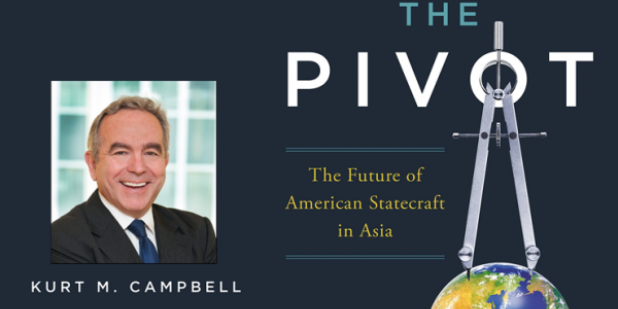Join us for a free one-day workshop for educators at the Japanese American National Museum, hosted by the USC U.S.-China Institute and the National Consortium for Teaching about Asia. This workshop will include a guided tour of the beloved exhibition Common Ground: The Heart of Community, slated to close permanently in January 2025. Following the tour, learn strategies for engaging students in the primary source artifacts, images, and documents found in JANM’s vast collection and discover classroom-ready resources to support teaching and learning about the Japanese American experience.
The Pivot: The Future of American Statecraft in Asia
Former Assistant Secretary of State for East Asian and Pacific Affairs Kurt M. Campbell, one of the chief architects of the pivot (also known as the rebalance), states in his new book, The Pivot: The Future of American Statecraft in Asia, that one of the central tenets of the Obama Administration’s pivot was building relationships with emerging Asian powers.
Where

Over the course of the past several presidential administrations, American foreign policy was characterized primarily by its engagement in the Middle East. When Barack Obama assumed office, he argued that the United States disproportionally allocated its resources toward the Middle East at its own peril. The 21st century, he argued, would be defined by the rise of Asian powers, like China. Therefore, the President believed that it was in America’s strategic best interest to shift its focus eastward to reflect the shift in the global balance of power.
Former Assistant Secretary of State for East Asian and Pacific Affairs Kurt M. Campbell, one of the chief architects of the pivot (also known as the rebalance), states in his new book, The Pivot: The Future of American Statecraft in Asia, that one of the central tenets of the Obama Administration’s pivot was building relationships with emerging Asian powers. Such initiatives as the U.S.-India-Japan trilateral dialogue, the Trans-Pacific Partnership, and various defense agreements with Asian nations, were praised by the Obama Administration, but met with deep criticism and suspicion from China. To Beijing, the ‘pivot to Asia’ was an aggressive containment strategy aimed at curbing China’s growing regional capabilities. Now, as tensions simmer across East Asia, from the Korean peninsula to the South China Sea, how has the rebalance affected America’s capacity to assert its influence in the region? Join us for a conversation with Dr. Kurt M. Campbell on his new book, his experience in crafting and implementing the ‘pivot to Asia’, and the future of America’s role in the region, with the National Committee on July 14 in New York City.
Featured Articles
Please join us for the Grad Mixer! Hosted by USC Annenberg Office of International Affairs, Enjoy food, drink and conversation with fellow students across USC Annenberg. Graduate students from any field are welcome to join, so it is a great opportunity to meet fellow students with IR/foreign policy-related research topics and interests.
RSVP link: https://forms.gle/1zer188RE9dCS6Ho6
Events
Hosted by USC Annenberg Office of International Affairs, enjoy food, drink and conversation with fellow international students.
Join us for an in-person conversation on Thursday, November 7th at 4pm with author David M. Lampton as he discusses his new book, Living U.S.-China Relations: From Cold War to Cold War. The book examines the history of U.S.-China relations across eight U.S. presidential administrations.




